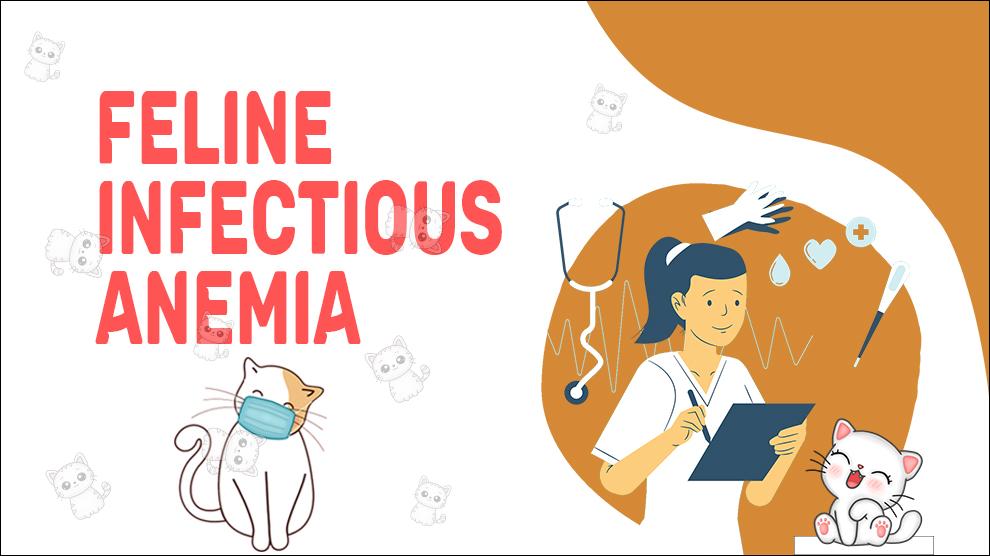* Petmoo is reader-supported. While you purchase merchandise by way of hyperlinks on our website, we might earn an affiliate fee without charge to you.

What Is Feline Infectious Anemia?
Feline Infectious Anemia (FIA) is a situation that impacts cats and is brought on by a parasite often called Mycoplasma Haemofelis.
The parasite attaches itself to the floor of purple blood cells, resulting in the destruction of the cells and anemia.
The situation is extra generally present in out of doors and stray cats however also can have an effect on indoor cats.
The severity of the illness can fluctuate from gentle to extreme, and in extreme circumstances, it may be deadly.
Signs Of Feline Infectious Anemia
The signs of FIA can fluctuate in severity relying on the stage of the illness.
A number of the commonest signs of FIA embody:
- Lethargy and weak point
- Anemia (low purple blood cell rely)
- Pale gums
- Lack of urge for food
- Weight reduction
- Fever
- Jaundice (yellowing of the pores and skin and eyes)
- Enlarged spleen
- Fatigue
- Speedy Respiration
- Speedy Heartbeat
- Melancholy
In case your cat displays any of those signs, it is very important see a veterinarian straight away for a correct analysis and therapy.
Remedy Choices For Feline Infectious Anemia
The therapy of feline infectious anemia depends upon the severity of the illness.
In gentle circumstances, supportive remedy could also be all that’s obligatory. This contains holding the cat heat, offering a nutritious eating regimen, and making certain that the cat is satisfactorily hydrated.
In additional extreme circumstances, blood transfusions could also be obligatory to exchange the purple blood cells which were destroyed.
Antibiotics can also be used to deal with secondary infections. In some circumstances, immunosuppressive medication could also be prescribed to deal with autoimmune hemolytic anemia.
Dwelling Treatments For Feline Infectious Anemia
There are not any house treatments for feline infectious anemia. The illness requires immediate veterinary therapy.
How To Forestall Feline Infectious Anemia?
Stopping feline infectious anemia includes taking steps to scale back the chance of publicity to the parasite that causes the illness.
Cats must be stored indoors or in a screened-in space to scale back their publicity to fleas and ticks. Common use of flea and tick preventives also can assist scale back the chance of an infection.
Cats must be examined for feline infectious anemia earlier than being launched to a brand new house or earlier than being allowed to mate.
If a cat is identified with the illness, it must be stored separate from different cats to scale back the chance of transmission.
Affected Cat Breeds Of Feline Infectious Anemia
All breeds of cats are prone to Feline Infectious Anemia, however the situation is extra generally present in out of doors and stray cats.
Causes For Feline Infectious Anemia
Causes:
Feline Infectious Anemia is brought on by the parasite Mycoplasma Haemofelis, which attaches itself to the floor of purple blood cells, resulting in their destruction and anemia.
The parasite is unfold by means of contact with contaminated cats, usually by means of bites from fleas, ticks, or different blood-sucking bugs.
The situation is extra generally present in out of doors and stray cats, however indoor cats also can turn into contaminated.
When To See A Vet For Feline Infectious Anemia?
In the event you discover any of the signs of feline infectious anemia in your cat, it is very important take it to the vet as quickly as doable.
The illness may be deadly if left untreated, so early analysis and therapy are important.
Meals Options For Feline Infectious Anemia
A nutritious eating regimen is essential for cats with feline infectious anemia. Cats must be fed high-quality business cat meals that’s excessive in protein and simply digestible.
Additionally it is essential to make sure that the cat is satisfactorily hydrated.
Feline infectious anemia is a severe illness that may be deadly if left untreated.
The illness is brought on by a parasite that’s transmitted by fleas and ticks. Signs of the illness embody lethargy, weak point, pale gums, and lack of urge for food.
Remedy of the illness includes supportive remedy, blood transfusions, and antibiotics. Stopping the illness includes decreasing publicity to fleas and ticks and common use of flea and tick preventives.
In the event you suspect that your cat has feline infectious anemia, it is very important take it to the vet as quickly as doable for analysis and therapy.


